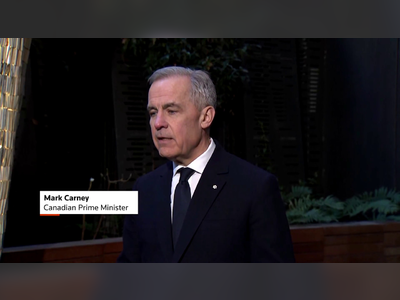Hungarian Government Touts Success Despite Citizens' Reduced Heating Amid Economic Strain
The Hungarian government is celebrating what it claims is a triumph in reducing inflation, despite evidence suggesting that decreased household heating due to cold weather played a significant role.
Amid a flurry of economic achievement propaganda, January has seen the nation's budget compromised and the Forint's exchange rate plummet against major currencies.
National Economy Minister Marton Nagy downplayed the dramatic fall in inflation to 3.8 percent in January, attributing the decline to targeted government policies rather than a severe decline in retail sales, which saw an annual deficit of 7.9 percent in the previous year. He cited measures like the online price monitoring system and mandated discounting as primary factors, rather than the dire cost-of-living crisis that saw Hungarian households cut back on heating costs.
Despite fulfilling the central bank's inflation target band of three percent, plus or minus one percent, there is skepticism around the methodology used, which compares fuel prices to the unusually high rates of last January and reports a 25 percent decrease in gas prices over the year—a figure not felt by consumers.
As expectations point to a resurgence in inflation later in the year, the government faces a tough challenge in boosting economic growth in 2023. Industrial production has already faltered, falling by 5.5 percent from the previous year, and by 13.7 percent in December 2023. The anticipated fiscal deficit is on shaky ground if economic growth fails to meet expectations.
The setback in the budget is clear; while January saw a surplus thanks to EU transfers, without the 226 billion forints in support, the government would have begun the year with a significant shortfall. A more robust surplus was anticipated due to the post-holiday value-added tax and income tax payments reflecting December's bonuses and regular wages.
Falling short of maintaining the budget law's deficit goal of 2.9 percent of GDP, the government has already drawn 51 billion forints from the central reserve. Budgetary realignments are focusing on cost-of-living defenses, economic development, sports, and church support.
This week, the Forint faced a steep decline, hitting 389 against the euro and 360.9 against the dollar, potentially triggered by the EU's infringement proceedings against Hungary over the sovereignty protection law. The exchange rate has since begun to correct following the release of the latest inflation data.
The Hungarian government, despite proclaiming the protection of its citizens' interests, is implicated in preserving jobs for guest workers over Hungarians. This is due to regulations making it more difficult to lay off foreign workers than their domestic counterparts. Foreign workers are increasingly filling state-supported positions, particularly in sectors heavily subsidized by the government, which favor such employment.
Adding to the critique is the protective move by the government towards the Hungarian Post, mandating that from March, every webshop must offer the state postal service as a shipping option. However, the specifics of this rule and its impact on market competition remain unclear.
In sports, the last independent football club in the top tier, Újpest, has seen its end of non-alignment with the country's ruling government structure as the majority ownership changes hands from the Belgian Duchatelet family to the Hungarian oil company, MOL.
As Transparency International's Corruption Perceptions Index indicates worsening conditions for Hungary with even Romania and Bulgaria showing improvement, the struggle against corruption continues. Despite the chaotic political landscape in these countries, their attempts to tackle graft have outpaced Hungary on the index, setting an example for others, including Ukraine, which must advance reforms to maintain Western support.
National Economy Minister Marton Nagy downplayed the dramatic fall in inflation to 3.8 percent in January, attributing the decline to targeted government policies rather than a severe decline in retail sales, which saw an annual deficit of 7.9 percent in the previous year. He cited measures like the online price monitoring system and mandated discounting as primary factors, rather than the dire cost-of-living crisis that saw Hungarian households cut back on heating costs.
Despite fulfilling the central bank's inflation target band of three percent, plus or minus one percent, there is skepticism around the methodology used, which compares fuel prices to the unusually high rates of last January and reports a 25 percent decrease in gas prices over the year—a figure not felt by consumers.
As expectations point to a resurgence in inflation later in the year, the government faces a tough challenge in boosting economic growth in 2023. Industrial production has already faltered, falling by 5.5 percent from the previous year, and by 13.7 percent in December 2023. The anticipated fiscal deficit is on shaky ground if economic growth fails to meet expectations.
The setback in the budget is clear; while January saw a surplus thanks to EU transfers, without the 226 billion forints in support, the government would have begun the year with a significant shortfall. A more robust surplus was anticipated due to the post-holiday value-added tax and income tax payments reflecting December's bonuses and regular wages.
Falling short of maintaining the budget law's deficit goal of 2.9 percent of GDP, the government has already drawn 51 billion forints from the central reserve. Budgetary realignments are focusing on cost-of-living defenses, economic development, sports, and church support.
This week, the Forint faced a steep decline, hitting 389 against the euro and 360.9 against the dollar, potentially triggered by the EU's infringement proceedings against Hungary over the sovereignty protection law. The exchange rate has since begun to correct following the release of the latest inflation data.
The Hungarian government, despite proclaiming the protection of its citizens' interests, is implicated in preserving jobs for guest workers over Hungarians. This is due to regulations making it more difficult to lay off foreign workers than their domestic counterparts. Foreign workers are increasingly filling state-supported positions, particularly in sectors heavily subsidized by the government, which favor such employment.
Adding to the critique is the protective move by the government towards the Hungarian Post, mandating that from March, every webshop must offer the state postal service as a shipping option. However, the specifics of this rule and its impact on market competition remain unclear.
In sports, the last independent football club in the top tier, Újpest, has seen its end of non-alignment with the country's ruling government structure as the majority ownership changes hands from the Belgian Duchatelet family to the Hungarian oil company, MOL.
As Transparency International's Corruption Perceptions Index indicates worsening conditions for Hungary with even Romania and Bulgaria showing improvement, the struggle against corruption continues. Despite the chaotic political landscape in these countries, their attempts to tackle graft have outpaced Hungary on the index, setting an example for others, including Ukraine, which must advance reforms to maintain Western support.
AI Disclaimer: An advanced artificial intelligence (AI) system generated the content of this page on its own. This innovative technology conducts extensive research from a variety of reliable sources, performs rigorous fact-checking and verification, cleans up and balances biased or manipulated content, and presents a minimal factual summary that is just enough yet essential for you to function as an informed and educated citizen. Please keep in mind, however, that this system is an evolving technology, and as a result, the article may contain accidental inaccuracies or errors. We urge you to help us improve our site by reporting any inaccuracies you find using the "Contact Us" link at the bottom of this page. Your helpful feedback helps us improve our system and deliver more precise content. When you find an article of interest here, please look for the full and extensive coverage of this topic in traditional news sources, as they are written by professional journalists that we try to support, not replace. We appreciate your understanding and assistance.

















